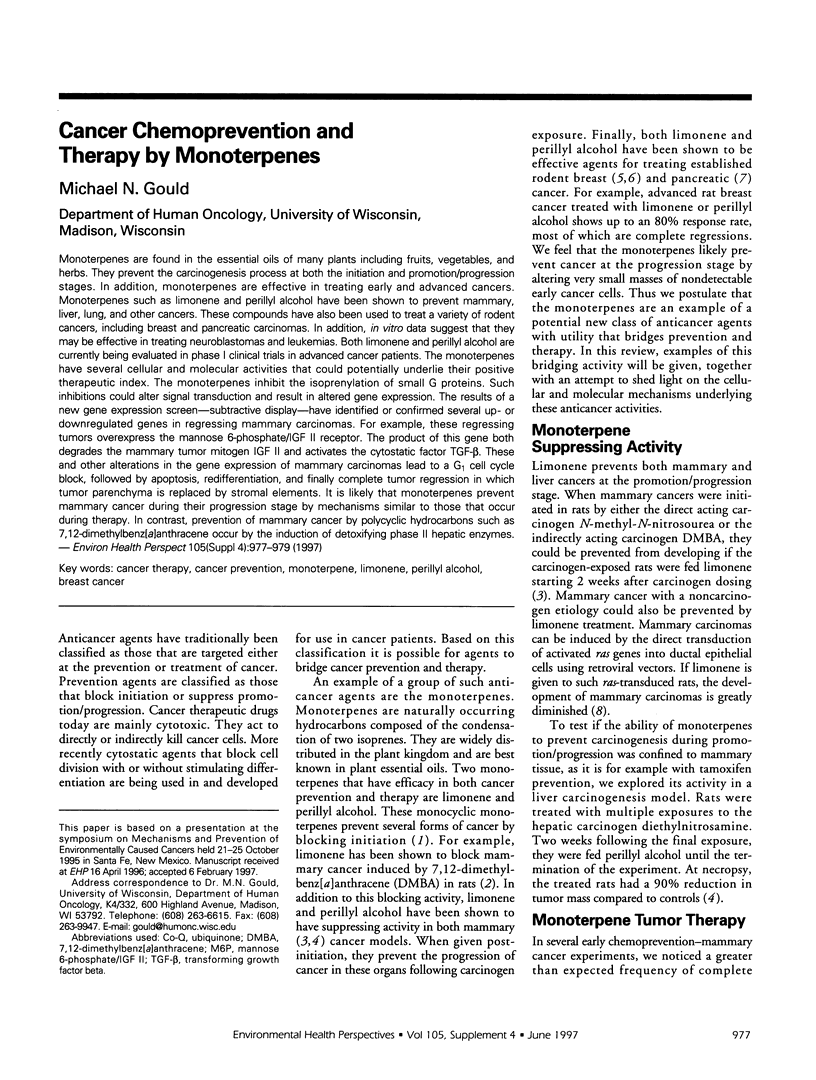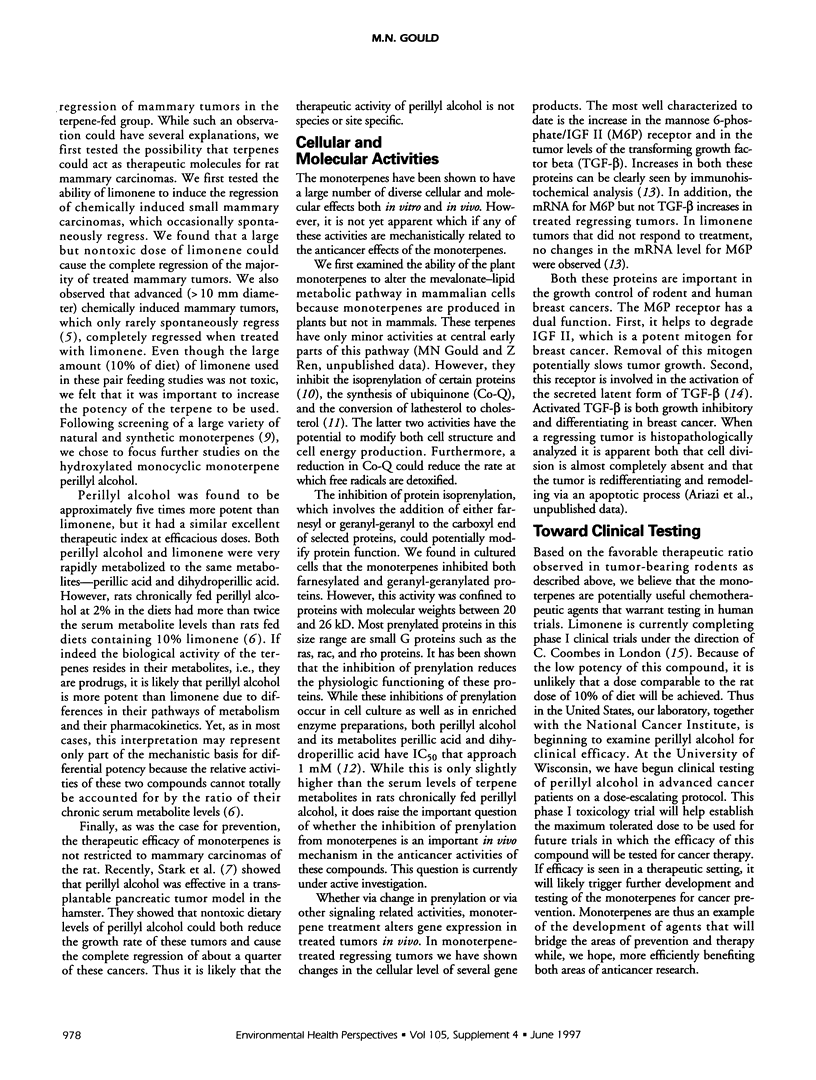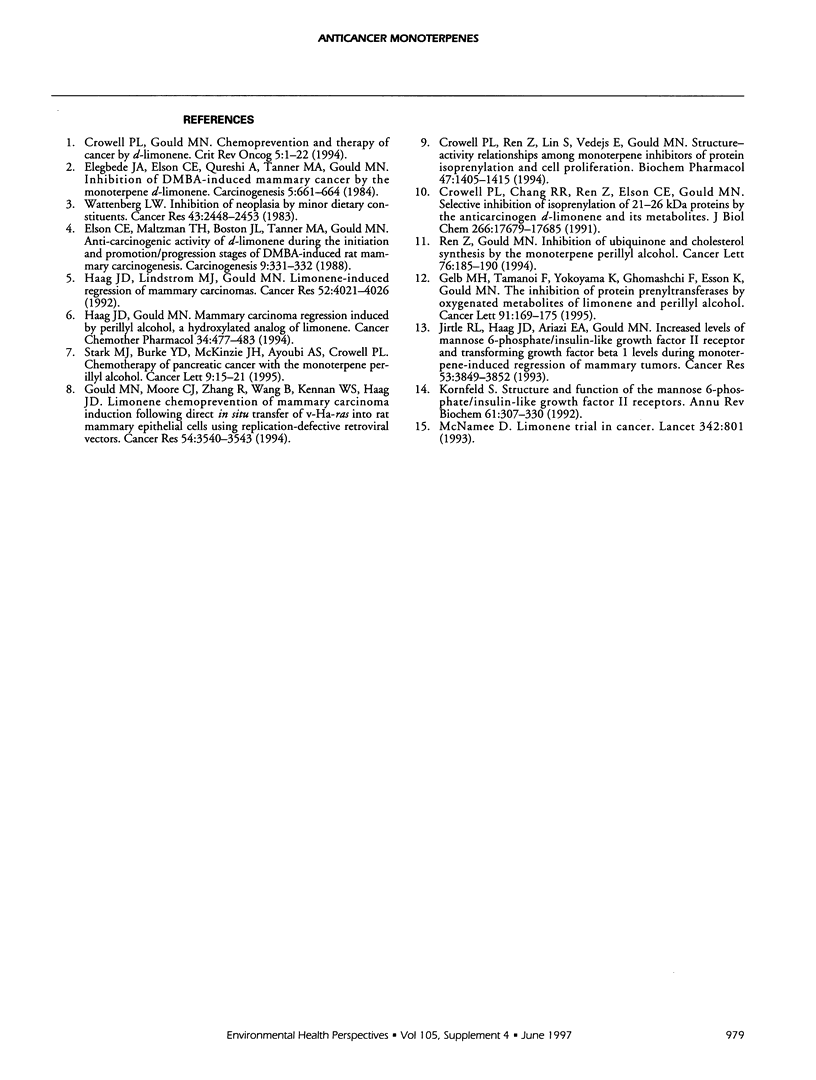Abstract
Monoterpenes are found in the essential oils of many plants including fruits, vegetables, and herbs. They prevent the carcinogenesis process at both the initiation and promotion/progression stages. In addition, monoterpenes are effective in treating early and advanced cancers. Monoterpenes such as limonene and perillyl alcohol have been shown to prevent mammary, liver, lung, and'other cancers. These compounds have also been used to treat a variety of rodent cancers, including breast and pancreatic carcinomas. In addition, in vitro data suggest that they may be effective in treating neuroblastomas and leukemias. Both limonene and perillyl alcohol are currently being evaluated in phase I clinical trials in advanced cancer patients. The monoterpenes have several cellular and molecular activities that could potentially underlie their positive therapeutic index. The monoterpenes inhibit the isoprenylation of small G proteins. Such inhibitions could alter signal transduction and result in altered gene expression. The results of a new gene expression screen-subtractive display-have identified or confirmed several up- or downregulated genes in regressing mammary carcinomas. For example, these regressing tumors overexpress the mannose 6-phosphate/IGF II receptor. The product of the gene both degrades the mammary tumor mitogen IGF II and activates the cytostatic factor TGF-beta. These and other alterations in the gene expression of mammary carcinomas lead to a G1 cell cycle block, followed by apoptosis, redifferentiation, and finally complete tumor regression in which tumor parenchyma is replaced by stromal elements. It is likely that monoterpenes prevent mammary cancer during their progression stage by mechanisms similar to those that occur during therapy. In contrast, prevention of mammary cancer by polycyclic hydrocarbons such as 7,12-dimethylbenz[a]anthracene occur by the induction of detoxifying phase II hepatic enzymes.
Full text
PDF


Selected References
These references are in PubMed. This may not be the complete list of references from this article.
- Crowell P. L., Chang R. R., Ren Z. B., Elson C. E., Gould M. N. Selective inhibition of isoprenylation of 21-26-kDa proteins by the anticarcinogen d-limonene and its metabolites. J Biol Chem. 1991 Sep 15;266(26):17679–17685. [PubMed] [Google Scholar]
- Crowell P. L., Gould M. N. Chemoprevention and therapy of cancer by d-limonene. Crit Rev Oncog. 1994;5(1):1–22. doi: 10.1615/critrevoncog.v5.i1.10. [DOI] [PubMed] [Google Scholar]
- Crowell P. L., Ren Z., Lin S., Vedejs E., Gould M. N. Structure-activity relationships among monoterpene inhibitors of protein isoprenylation and cell proliferation. Biochem Pharmacol. 1994 Apr 20;47(8):1405–1415. doi: 10.1016/0006-2952(94)90341-7. [DOI] [PubMed] [Google Scholar]
- Elegbede J. A., Elson C. E., Qureshi A., Tanner M. A., Gould M. N. Inhibition of DMBA-induced mammary cancer by the monoterpene d-limonene. Carcinogenesis. 1984 May;5(5):661–664. doi: 10.1093/carcin/5.5.661. [DOI] [PubMed] [Google Scholar]
- Elson C. E., Maltzman T. H., Boston J. L., Tanner M. A., Gould M. N. Anti-carcinogenic activity of d-limonene during the initiation and promotion/progression stages of DMBA-induced rat mammary carcinogenesis. Carcinogenesis. 1988 Feb;9(2):331–332. doi: 10.1093/carcin/9.2.331. [DOI] [PubMed] [Google Scholar]
- Gelb M. H., Tamanoi F., Yokoyama K., Ghomashchi F., Esson K., Gould M. N. The inhibition of protein prenyltransferases by oxygenated metabolites of limonene and perillyl alcohol. Cancer Lett. 1995 May 8;91(2):169–175. doi: 10.1016/0304-3835(95)03747-k. [DOI] [PubMed] [Google Scholar]
- Gould M. N., Moore C. J., Zhang R., Wang B., Kennan W. S., Haag J. D. Limonene chemoprevention of mammary carcinoma induction following direct in situ transfer of v-Ha-ras. Cancer Res. 1994 Jul 1;54(13):3540–3543. [PubMed] [Google Scholar]
- Haag J. D., Gould M. N. Mammary carcinoma regression induced by perillyl alcohol, a hydroxylated analog of limonene. Cancer Chemother Pharmacol. 1994;34(6):477–483. doi: 10.1007/BF00685658. [DOI] [PubMed] [Google Scholar]
- Haag J. D., Lindstrom M. J., Gould M. N. Limonene-induced regression of mammary carcinomas. Cancer Res. 1992 Jul 15;52(14):4021–4026. [PubMed] [Google Scholar]
- Jirtle R. L., Haag J. D., Ariazi E. A., Gould M. N. Increased mannose 6-phosphate/insulin-like growth factor II receptor and transforming growth factor beta 1 levels during monoterpene-induced regression of mammary tumors. Cancer Res. 1993 Sep 1;53(17):3849–3852. [PubMed] [Google Scholar]
- Kornfeld S. Structure and function of the mannose 6-phosphate/insulinlike growth factor II receptors. Annu Rev Biochem. 1992;61:307–330. doi: 10.1146/annurev.bi.61.070192.001515. [DOI] [PubMed] [Google Scholar]
- Ren Z., Gould M. N. Inhibition of ubiquinone and cholesterol synthesis by the monoterpene perillyl alcohol. Cancer Lett. 1994 Jan 30;76(2-3):185–190. doi: 10.1016/0304-3835(94)90396-4. [DOI] [PubMed] [Google Scholar]
- Stark M. J., Burke Y. D., McKinzie J. H., Ayoubi A. S., Crowell P. L. Chemotherapy of pancreatic cancer with the monoterpene perillyl alcohol. Cancer Lett. 1995 Sep 4;96(1):15–21. doi: 10.1016/0304-3835(95)03912-g. [DOI] [PubMed] [Google Scholar]


